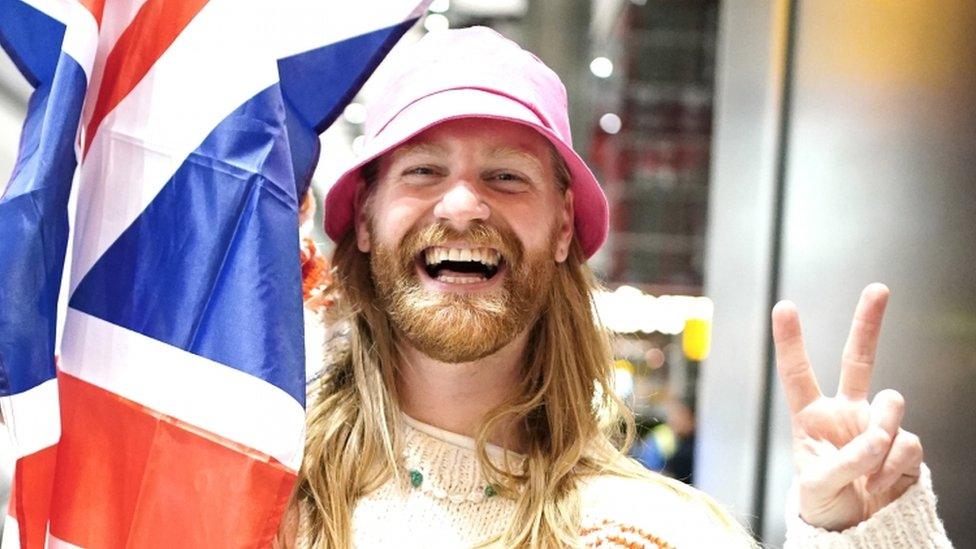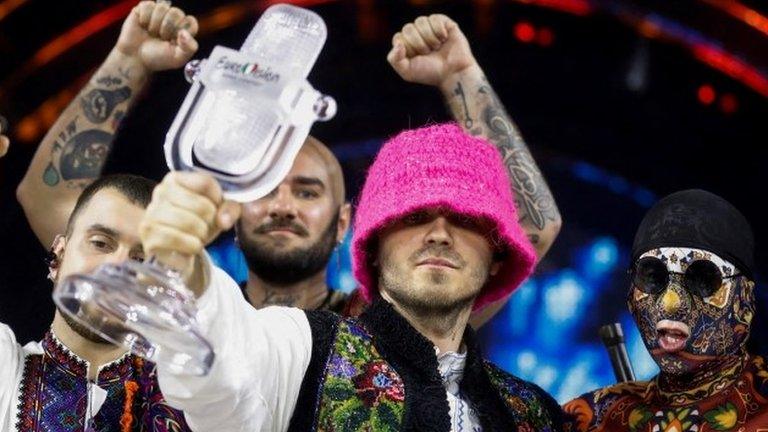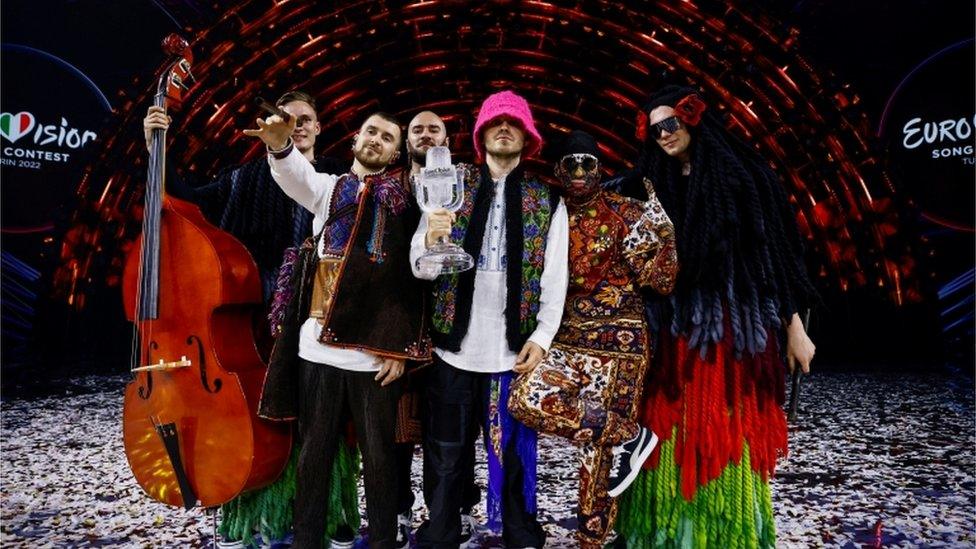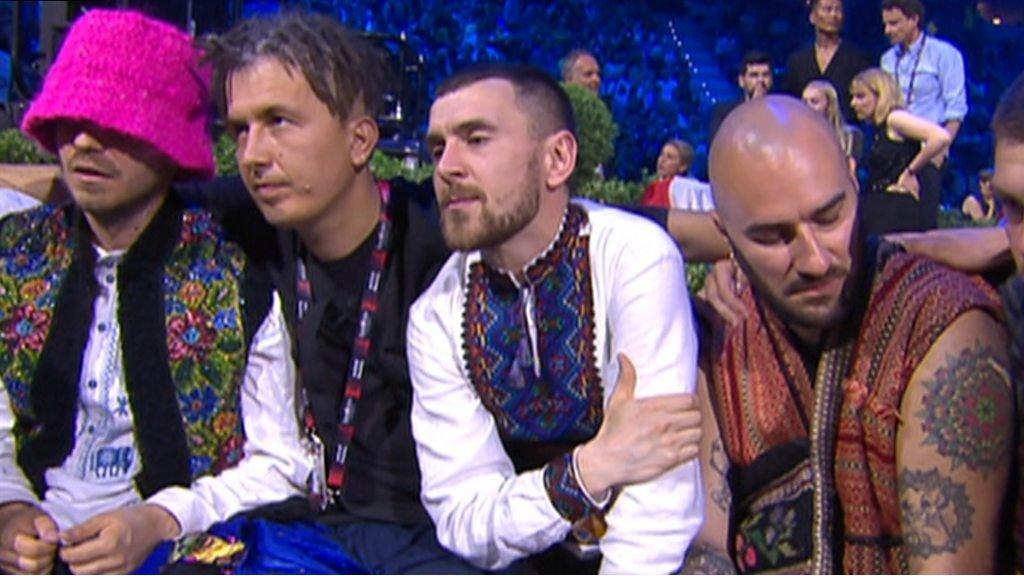Eurovision: UK in talks to host 2023 contest instead of Ukraine
- Published
- comments

The UK's Sam Ryder was recently pictured in a pink Kalush Orchestra hat, in a nod to this year's Ukrainian winners
The BBC is in talks with the European Broadcasting Union (EBU) to potentially host the 2023 Eurovision Song Contest in the UK - not Ukraine.
The show's organisers decided, after a "full assessment and feasibility study", that the event cannot be held in the winning country, Ukraine.
This is due to the ongoing war following Russia's invasion. So, they turned to the UK, which came second.
But Kyiv said it disagreed with the EBU's decision and would appeal.
Traditionally, the winning country is asked to host the following year's contest.
Reacting to the EBU's decision, Ukrainian Culture Minister Oleksandr Tkachenko said Kyiv "believes that it has grounds for conducting further talks on finding a solution that will satisfy all."
"Hosting Eurovision 2023 in Ukraine is a powerful signal to all the world, which is supporting Ukraine now. We will be demanding to change the decision, because we believe that we will be able to fulfil all our obligations".
Meanwhile, Mykola Chernotytskyi, head of the managing board of Ukrainian broadcaster UA: PBC, said: "Security is, of course, our first priority. The team of UA: PBC, state and local authorities did a thorough job and offered different options."
He added: "It is a pity to see such an unappealable statement, therefore, we ask our partners to hold further negotiations."
Sam Ryder came second for the UK, the country's best result since 1998, at this year's event in May.
Ryder topped the jury vote in Turin in May, but rap-folk band Kalush Orchestra, who were given special permission to leave the war-torn country to compete, soared to first place with 631 points in a symbolic show of public support.

Eurovision hosting facts
The UK has hosted Eurovision eight times, external - more than any other country.
It has taken over hosting duties for other countries four times.
It hosted for the Netherlands in 1960, for France in 1963, for Monaco in 1972; and Luxembourg in 1974.
The UK last hosted in 1998, from Birmingham, after Katrina and the Waves' win.
Harrogate, Brighton, Edinburgh and London have also been host cities.
Israel was the last country that declined to host, in 1980, having also won the year before.

The EBU said in a statement, external it had conducted the study with Ukrainian state broadcaster UA:PBC and external specialists, amid the conflict, but that the "security and operational guarantees" required to host the event cannot be fulfilled in the war-torn country.
The organisation thanked the winning nation's broadcaster for its "wholehearted cooperation and commitment in exploring all scenarios" and said it shared in "their sadness and disappointment", adding it would continue to support them.
"As a result of this decision, in accordance with the rules and to ensure the continuity of the event, the EBU will now begin discussions with the BBC, as this year's runner-up, to potentially host the 2023 Eurovision Song Contest in the United Kingdom," the statement read.
"It is our full intention that Ukraine's win will be reflected in next year's shows. This will be a priority for us in our discussions with the eventual hosts."
The UK won the jury vote before Ukraine stormed into the lead following huge public support
A BBC spokesman added: "We have seen the announcement from the EBU. Clearly these aren't a set of circumstances that anyone would want. Following their decision, we will of course discuss the BBC hosting the Eurovision Song Contest."
Katrina Leskanich, lead singer for the UK's winning 1997 Eurovision entry Katrina and the Waves with their song Love Shine A Light, tweeted, external: "Practically hysterical over the announcement that the UK could host!"
Downing Street welcomed the possibility of the UK hosting Eurovision if Ukraine cannot, pledging to ensure it would "overwhelmingly reflect Ukraine's rich culture, heritage and creativity".
"Ukraine's victory... was richly deserved and as the rightful winner the government's firm wish has been to see next year's contest hosted there," said a government spokesperson.
"If the EBU decides the competition can't go ahead in Ukraine, we would of course welcome the opportunity to work closely with Ukraine and the BBC to host it here in the UK."
They added the government was also committed to "building on the ongoing partnership between our two countries".
Asked if the government would help the BBC with the costs, the spokesman said "we're slightly getting ahead of ourselves in terms of the process".

Norway's Give That Wolf A Banana were an eye-catching act at this year's contest
Which city might host Eurovision 2023?
A number of locations have put their hats in the ring if the UK does end up hosting the contest.
Scotland's First Minister Nicola Sturgeon said she, external wished Eurovision could be in Ukraine, but "understand that in circumstances this isn't possible".
"However, I can think of a perfect venue on banks of the River Clyde!" she added, apparently suggesting the 14,300-capacity riverside OVO Hydro arena in Glasgow as a venue.
Bev Craig, the leader of Manchester City Council, also threw the city's hat in the ring, saying, external: "Not the circumstances that anyone would want given the war in Ukraine. But if it's to be a UK city - I can't think of anywhere better, a great music city and fittingly home to a large Ukrainian community."
Leeds had hoped to be European Capital of Culture in 2023, before Brexit prevented UK cities from entering that contest. The city is ploughing on with staging a year of culture anyway, and Leeds City Council said having Eurovision in the city "could not come at a better time".
Mayor of London Sadiq Khan tweeted, external that the UK capital "would welcome Eurovision with open arms", adding: "We're ready to step up and support Ukraine by hosting a contest that pays tribute to and honours the Ukrainian people, and also celebrates the very best of Britain too."
Liverpool, Cardiff, Aberdeen, Brighton, Belfast and Birmingham have also all been suggested as possibilities.
If the UK is confirmed as the host country, cities would have to prove they have the right facilities and go through a bidding process.
Related topics
- Published17 June 2022

- Published15 May 2022

- Published15 May 2022

- Published14 May 2022
